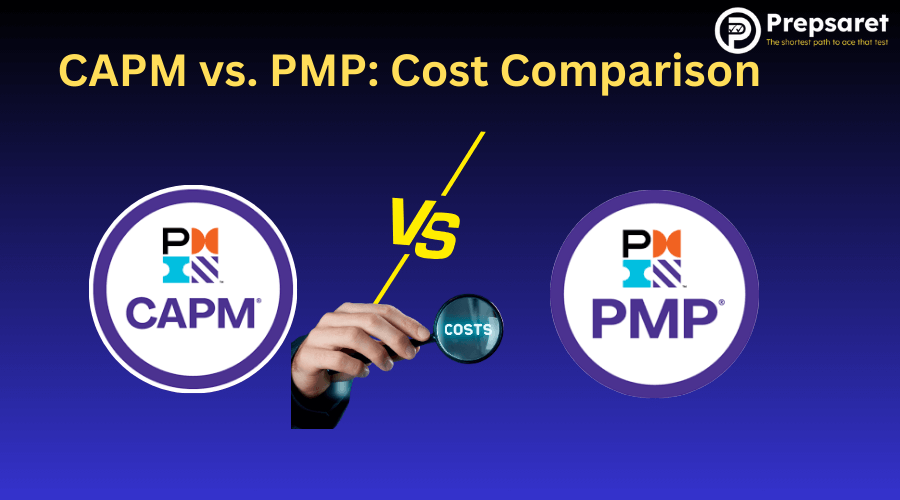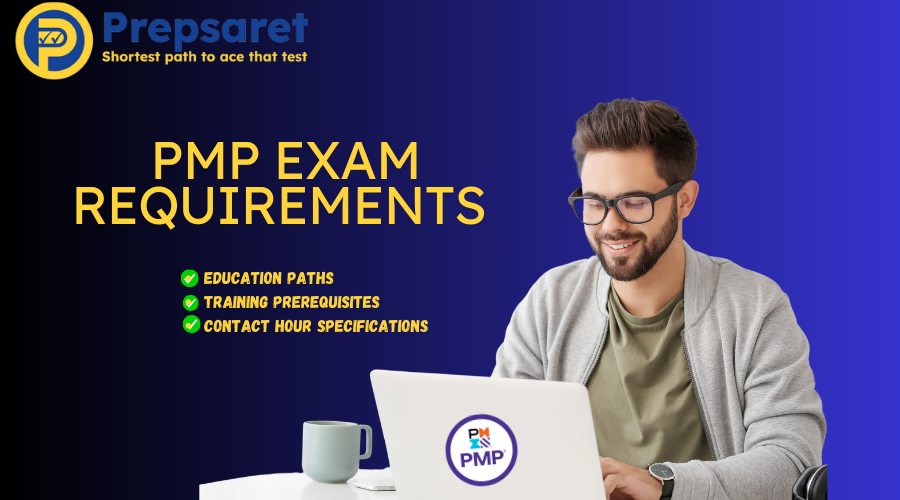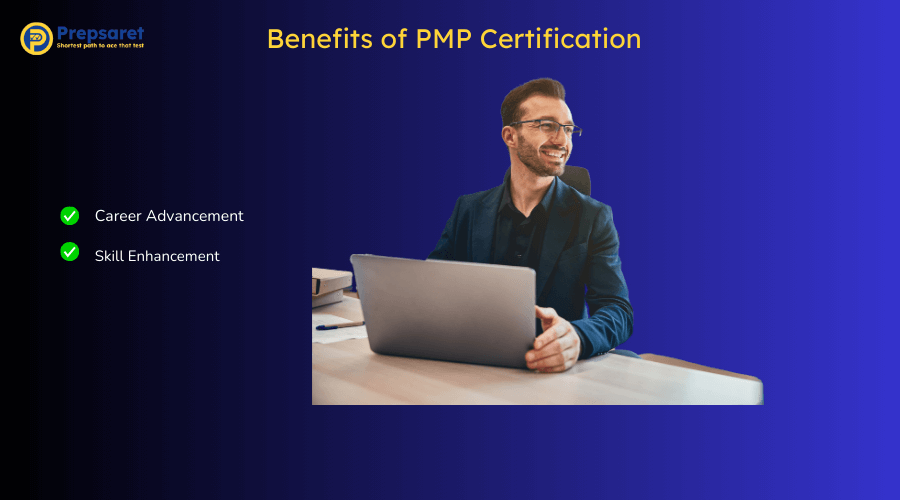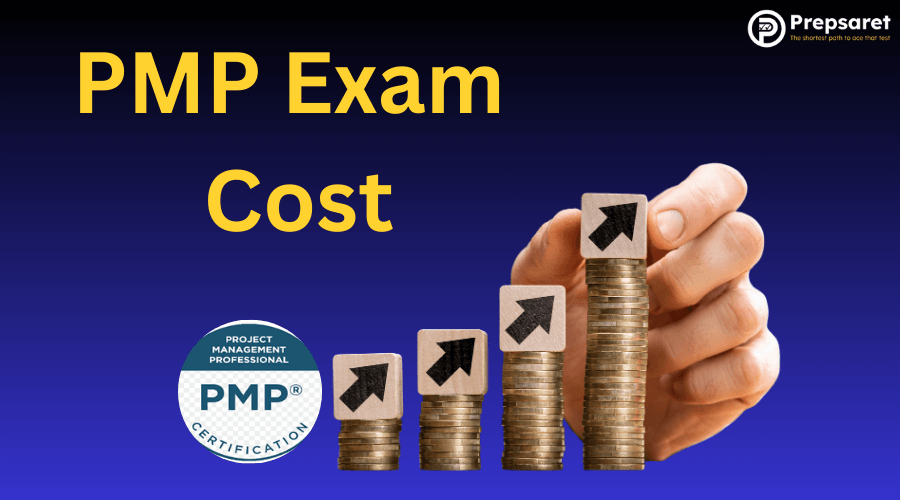Thinking about taking your project management career to the next level? You’ve probably wondered about the PMP exam and its cost. While earning your PMP certification does involve an investment, the benefits far outweigh the expense.
Becoming a Project Management Professional (PMP) can lead to higher salaries, career advancement, and international recognition in project management.
The best part? You don’t need to spend a lot on study materials. Prepsaret.com offers affordable, effective resources that can help you pass the PMP exam on your first try. With the right tools, PMP certification is a true game-changer for your career!
PMP Exam Cost
When considering the PMP exam cost, it’s important to understand all the associated fees, including the initial exam fee, retake fees, PMP exam prep costs, and PMP certification renewal expenses.
Here’s a breakdown of the PMP exam fees and other related costs:
PMP Exam Fees for PMI Members vs Non-Members in 2025
- PMI Members
The PMP exam cost for PMI members is $405.
Becoming a PMI member offers a discounted exam fee, along with other resources and benefits like webinars, articles, and more.
- Non-PMI Members:
The PMP exam cost for non-members is $555.
This price difference highlights the advantage of PMI membership in reducing your overall exam costs.
The PMI membership itself costs $139 annually, plus a one-time $10 application fee.
Simple math shows that becoming a member before taking the PMP test actually saves you money!
PMP Exam Prep Cost
In addition to the exam fees, many candidates opt for PMP exam prep courses or study materials to ensure they pass the PMP exam on their first attempt. These costs can vary:
- PMP Exam Prep Courses:
Prices for PMP exam prep courses can range from $200 to $2,000.These costs depend on the format (online, self-paced, in-person) and the provider
- Study Materials:
Books and practice exams can add to the cost, typically ranging from $50 to $500. Study materials like the PMBOK Guide and practice tests are essential for preparation.
PMP Certification Renewal and Associated Fees
Once you’ve earned your PMP certification, you’ll need to maintain it by fulfilling renewal requirements:
- Renewal Fee:
- PMI Members: The PMP certification renewal fee for members is $60.
- Non-PMI Members: The renewal fee for non-members is $150.
- PDUs Requirement:
- You’ll need to earn 60 PDUs (Professional Development Units) over the 3-year certification cycle to renew your PMP certification.
PMP Retake Fees
What about if you don’t pass? If you don’t pass on your first attempt, the retake fees are:
- PMI Members: $275
- Non-PMI Members: $375
Smart planning can help you minimize these costs while maximizing the benefits of your certification.
CAPM vs. PMP: Cost Comparison

The Certified Associate in Project Management (CAPM) certification is more affordable than the Project Management Professional (PMP) certification.
Below is a cost breakdown:
| Factor | CAPM | PMP | |
| Training/Course | $200–$500 | $100–$3,500 | |
| Exam Fee (PMI Member) | $225 | $405 | |
| Exam Fee (Non-Member) | $300 | $575 | |
| Renewal Fee | $60–$150 | $60–$150 |
CAPM is ideal for entry-level professionals, while PMP suits experienced project managers.
Factors That Affect PMP Exam Cost
Several factors influence the total PMP certification cost you’ll end up paying:
- PMI membership status – As mentioned above, being a member saves you $150 on the PMP exam fees.
- Training requirements – All applicants need 35 hours of project management education. A PMP exam prep course can range from $300 to $3,000 depending on the provider and format.
- Ongoing costs – PMP certification holders must earn 60 Professional Development Units (PDUs) every three years for PMP certification renewal.
- Training partner selection – Choosing the right training partner can significantly impact both your success rate and overall costs in the PMP certification process.
- Study materials – Quality study resources are essential to prepare for the PMP exam. With Prepsaret.com, you can choose study plans for 1, 2, or 3 months, tailored to your schedule and learning pace.
Choose your study plan:
When considering these factors, remember that investing in quality preparation materials often means spending less in the long run by avoiding retake fees.
What is the PMP Certification and Why Should You Consider It?
The project management professional (PMP) certification is the gold standard in project management certification.
Issued by the Project Management Institute, this credential validates your ability to lead projects according to global standards.
The PMP certification exam covers knowledge areas outlined in the Project Management Body of Knowledge (PMBOK), which serves as the foundation for best practices in the field.
Certified project managers demonstrate mastery of essential project management knowledge across various domains.
Benefits of getting certified include:
- Global Recognition: It is respected worldwide, making it valuable across industries like IT, construction, and healthcare.
- Career Boost: The PMP certification opens doors to higher-paying roles and greater job security.
- Proven Expertise: It shows you’re up to date with project management processes, project management software, and project management knowledge.
In today’s competitive job market, having the PMP credential signals to employers that you’re committed to excellence and equipped with the skills needed to deliver successful projects.
What Are the PMP Certification Requirements?

Before you worry about the PMP exam cost, make sure you meet the PMP certification requirements. PMI has specific eligibility criteria based on your education level:
If you have a four-year bachelor’s degree, it requires:
- 36 months of project management experience
- 35 contact hours of project management education
If you have a high school diploma or associate’s degree, it requires::
- 60 months of project management experience
- 35 contact hours of project management education
Your degree determines how much work experience you need before applying. The high school diploma path requires more hands-on experience to compensate for less formal education.
These requirements ensure that PMP certification holders have both theoretical knowledge and practical experience, making the credential truly valuable in the workplace.
The PMP Exam: A Step-by-Step Guide to Preparation
Creating a structured preparation plan is essential to pass the PMP exam. Here’s a step by step guide to help you navigate the PMP certification process:
- Verify eligibility and apply – Make sure you meet all requirements before starting the PMP certification process.
- Choose a PMP exam prep course – Select a training provider that fits your learning style and budget.
- Study the PMBOK Guide – This essential resource covers all the concepts you’ll encounter in exam questions.
- Take practice exams – Regular practice helps you get comfortable with the format and timing of the PMP test.
- Review weak areas – Use your practice test results to identify and strengthen knowledge gaps.
- Develop a strategy for different types of PMP exam questions – The exam includes various question formats that require different approaches.
This comprehensive guide to prepare for the PMP examination will help you join the ranks of PMP certified professionals with confidence. Remember, thorough PMP exam prep is your key to success!
Why Prepsaret is the Best Choice for PMP Prep
When it comes to PMP exam prep, Prepsaret stands out from the competition for several reasons:
- Practice questions that mirror actual exam content – Prepsaret’s questions reflect exact questions tested in the main exam, making passing the test easier.
- Affordable yet comprehensive study materials – Get everything you need without breaking the bank.
- Flexible study plans – Choose between 1, 2, or 3-month preparation tracks based on your schedule.
- User-friendly interface – Focus on learning instead of figuring out complicated platforms.
- Regular updates – Study materials are continuously updated to reflect the latest exam patterns.
Prepsaret practice questions are truly the best since they closely match what you’ll face in the actual certification test, significantly increasing your chances of success on the first attempt.
Try out: Free PMP Practice Questions
PMP Certification Training: Course Options and Costs
When budgeting for your certification, PMP certification training is a significant component to consider. A quality PMP certification training course typically ranges from $300 to $2,500 depending on the format and provider.
Options for fulfilling the 35-hour training requirement include:
- Self-paced online courses ($300-$800)
- Live virtual classes ($600-$1,500)
- In-person bootcamps ($1,000-$2,500)
- University programs ($1,200-$3,000)
When selecting a PMP certification training partner, consider factors beyond just price. The training requirement is not just a box to check in the PMP certification process – it’s the foundation for your exam success.
Quality course material should cover all knowledge areas and prepare you for various question types on the exam.
Many candidates find that a good PMP exam prep course saves them money in the long run by helping them pass on the first attempt.
PMP Exam: What to Expect and How to Pass
To pass the PMP exam, you need to understand its structure and content. The test consists of 180 questions to be completed in 230 minutes, covering:
- People (42%)
- Process (50%)
- Business Environment (8%)
Questions will test your knowledge of project management best practices across different delivery approaches:
- Predictive project management approaches (traditional waterfall)
- Agile or hybrid approaches (flexible, iterative methods)
The exam questions often present scenarios that require you to apply project management processes in real-world situations. You’ll need to demonstrate understanding of:
- Risk management techniques
- Team leadership strategies
- Various project management software applications
- How projects impact the business environment
Remember, practice makes perfect – the more sample questions you attempt, the better prepared you’ll be for the actual exam.
The Value of PMP Certification in Your Project Management Career

Is the PMP worth the investment? Absolutely! The benefits to your project management career extend far beyond just adding letters after your name.
Let’s look at the financial impact first. PMP certified professionals enjoy a significantly higher salary than their non-certified peers.
The average salary difference is around 29%, with certified project managers earning $120,000 annually in the US.
Beyond compensation, PMP certification opens doors to better project management positions. As a credential holder, you’ll:
- Be equipped to lead complex projects across industries
- Join an elite group of PMP certification holders worldwide
- Stand out as an experienced project manager in job searches
- Have greater mobility between industries and countries
- Gain respect as a certified associate in the field
Employers value the PMP because it demonstrates your commitment to the profession and validates your abilities against global standards.
Find out More: How the PMP Certification Pays Off
How Long Does the PMP Certification Last and What Are the Renewal Requirements?
Your PMP certification doesn’t last forever. Every three years, PMP certification renewal is required to maintain your credential. This ensures PMP certification holders stay current with evolving best practices.
The renewal process involves:
- Earning 60 professional development units (PDUs) over the three-year cycle
- Paying a renewal fee ($60 for PMI members, $150 for non-members)
- Submitting your PDU information through PMI’s Continuing Certification Requirements System
PDUs can be earned through various activities:
- Attending seminars and workshops
- Taking courses
- Reading project management literature
- Contributing to the profession (speaking, writing, volunteering)
- Working as a practitioner
This ongoing education requirement is an important part of the PMP certification process that keeps your knowledge fresh and relevant throughout your career.
FAQs
Is Passing The PMP Exam Hard?
Yes, the PMP exam is challenging due to its focus on real-world project management scenarios and diverse methodologies like predictive, agile, and hybrid approaches. Preparation typically requires 2-3 months of dedicated study.
Can I Pass PMP In 10 Days?
Passing the PMP in 10 days is extremely difficult but possible with intense preparation, prior experience, and familiarity with PMBOK concepts. A structured study plan and practice exams are essential.
Is PMP Harder Than CPA?
PMP and CPA exams are both rigorous but differ in focus. PMP tests project management knowledge across methodologies, while CPA covers accounting principles. Difficulty depends on your background and expertise.
Conclusion: Is PMP Certification Worth the Investment?
When you consider the PMP exam cost, training expenses, and time investment, you may wonder if it’s worth it. The answer is yes! The PMP certification provides exceptional value for your career. It opens doors to career advancement, offering access to positions that may otherwise be closed.
PMP certification holders are highly sought after across industries. While there are initial costs, the long-term benefits far outweigh them. With Prepsaret, you can reduce costs and maximize your chances of passing the PMP exam on your first attempt.
Ready to take the next step? Start planning your PMP certification journey today!

